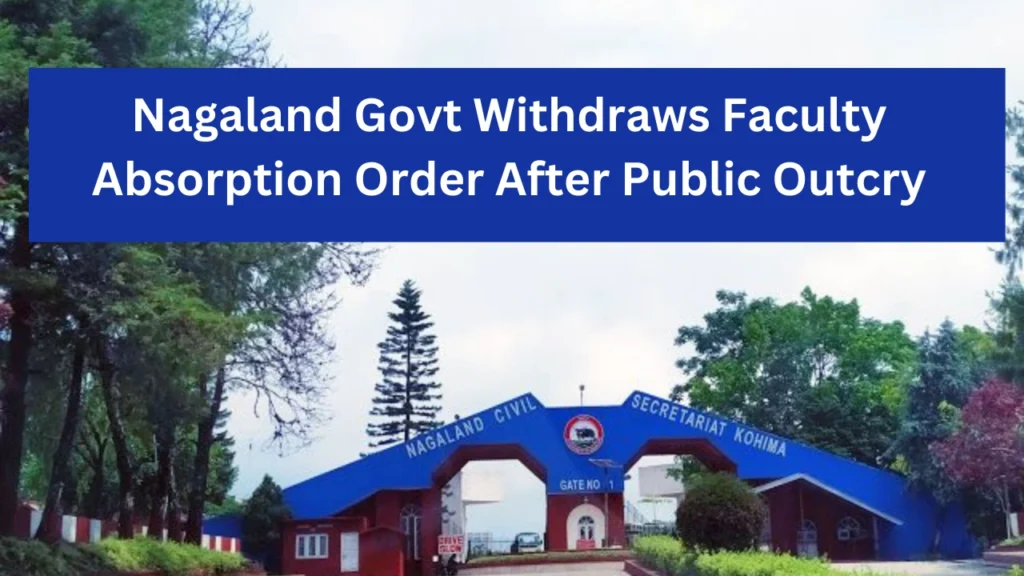The Nagaland government’s recent move to regularise 147 contractual assistant professors and librarians across various government colleges has ignited a firestorm of controversy, polarising public opinion and drawing sharp criticism from academic forums, scholar groups, and civil service aspirants. Initially framed as a decision made “in the interest of public service,” the directive—issued on April 8, 2025—was abruptly revoked just two days later, with officials declaring the order “null and void.”
At the heart of the issue lies a growing debate over recruitment transparency, institutional accountability, and the future of merit-based appointments in Nagaland’s higher education system. While student unions from several government colleges lauded the move for recognising the dedication of long-serving contractual staff, critics allege it bypassed the Nagaland Public Service Commission (NPSC), undermining years of preparation by NET-qualified and PhD-holding candidates. With legal petitions pending since 2022 over alleged backdoor appointments, the controversy has once again highlighted the fragile trust in public hiring processes and the growing demand for fair and competitive recruitment practices.
Let’s break down what happened, who supported it, who opposed it, and what this means for future recruitment in Nagaland’s higher education sector.

What Was the April 8, 2025, Order?
On April 8, 2025, the Chief Secretary of Nagaland, with approval from the Minister of Higher Education and Tourism, issued a notification allowing the absorption of several contractual assistant professors into regular government service. These faculty members were serving in colleges such as:
- Dimapur Government College
- Kohima Science College, Jotsoma
- Sao Chang College, Tuensang
- Zunheboto Government College
The order stated the regularisation was done “in the interest of public service”, aiming to address the severe shortage of faculty ahead of implementing the Four-Year Undergraduate Programme (FYUGP) in Nagaland.
Government Rollback on April 10, 2025
Facing rising criticism, the state government revoked the order on April 10 via a new circular. The fresh notice clarified that the previous notification was “not officially issued” and should be treated as “null and void until further notice.” All college principals were directed not to process any administrative changes related to the regularisation.
Chief Secretary Dr. J Alam, IAS, released a public clarification stating that the viral notification circulating on social media was not valid.
Who Supported the Faculty Absorption?
Despite the sudden withdrawal, support poured in from students’ unions and college councils across Nagaland:
Dimapur Government College Students’ Council
In a letter dated April 9, the council thanked the Department of Higher Education, stating the move acknowledged the hard work of faculty who had served “with utmost sincerity” and helped the college prepare for the FYUGP.
Kohima Science College Students’ Union, Jotsoma
They initially welcomed the regularisation, saying these teachers “ensured academic continuity” and “prevented any learning gaps during staff shortages.” However, they later withdrew support, stating they would not take sides after further internal discussions.
Sao Chang College Students’ Union, Tuensang
The union mentioned that the regularised teachers were instrumental in helping the college attain NAAC Accreditation, and without their continued service, the college would still face faculty shortages, especially under the New Education Policy (NEP).
Zunheboto Government College Students’ Union
This group noted that some faculty had served six to twelve years under tough conditions, often as the only teachers in their departments. Their letter praised the government’s attempt to finally recognise these teachers’ long service.
Who Opposed the Absorption Move?
While some students showed support, strong opposition emerged from various academic and youth groups, citing lack of transparency and unfair practices.
Dimapur Naga Students’ Union (DNSU)
The DNSU condemned the move, alleging it bypassed the Nagaland Public Service Commission (NPSC), denying deserving and qualified candidates their chance at fair recruitment.
Naga Research Scholars’ Forum, Shillong (NRSFS)
This academic forum labeled the regularisation a “harsh blow” to merit-based recruitment, especially for candidates who had cleared NET or held PhDs and were preparing for the Common Educational Services Examination (CESE).
Nagaland NET Qualified Forum (NNQF)
The NNQF launched a poster campaign on social media, protesting the government’s decision and calling for merit-based, ethical recruitment policies. Their campaign quickly gained traction online.
Background: The Ongoing Legal Dispute
This incident occurs while several writ petitions filed in 2022 are still pending in court, challenging earlier alleged backdoor appointments in Nagaland’s higher education institutions. The new absorption attempt sparked fears of setting a dangerous precedent where recruitment rules are ignored for political or administrative convenience.
What’s Next?
- The government’s rollback doesn’t cancel the debate, it only postpones it.
- College managements and students remain uncertain about staff continuity for the upcoming FYUGP rollout.
- Aspirants and qualified candidates are demanding NPSC-led fair selection based on transparent and competitive exams.
- Legal follow-up on the matter remains pending in court.
Conclusion
The April 2025 notification and its hasty rollback highlight the growing tensions between meritocracy and administrative discretion in Nagaland’s education sector. As students call for stability and opponents push for fairness, all eyes are now on the state judiciary and the Department of Higher Education for the next steps in this unfolding issue.
Stay updated with the latest on faculty recruitment, student movements, and government orders in Nagaland by following verified news sources and educational forums.
